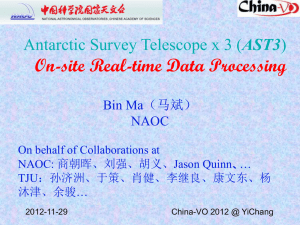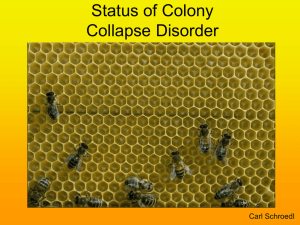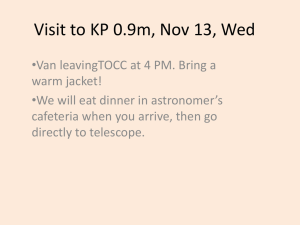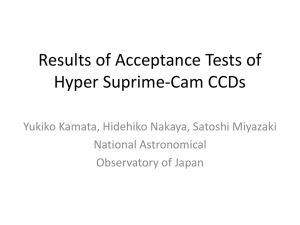Test and Operation of AST
advertisement
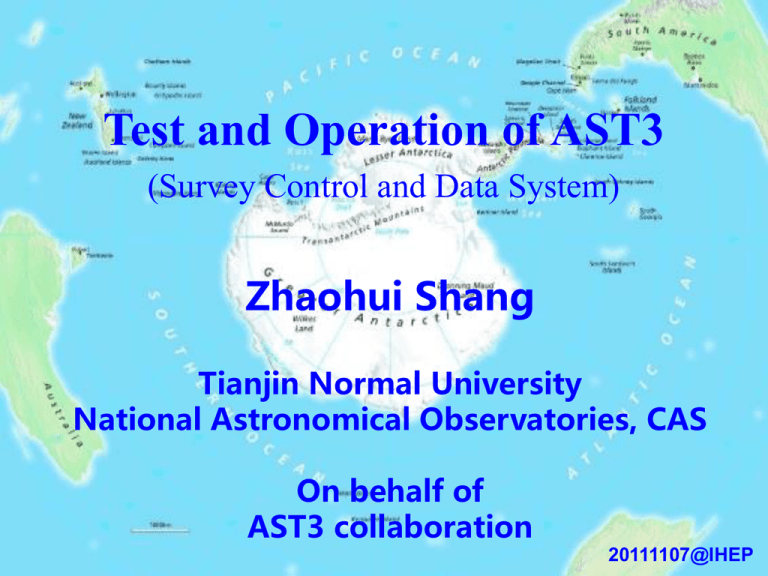
Test and Operation of AST3 (Survey Control and Data System) Zhaohui Shang Tianjin Normal University National Astronomical Observatories, CAS On behalf of AST3 collaboration 20111107@IHEP Telescope and CCD Camera Antactic Survey Telescope x 3 (AST3) • Three 50/68cm modified Schmidt Telescopes; • Filters: g, r, i, IR(?), • CCD: 10k x 10k, 9 micron/pixel (STA1600-FT) - To be operated with 10k x 5k - Frame transfer • Plate Scale: 1 arcsec/pixel • FOV: ~ 4.3 square deg Antactic Survey Telescope x 3 (AST3) • Plan to install one in 2011 • Power supplied by PLATO-A (UNSW) Instruments Engines AST3 CCD Camera • • • • No shutter To be operated in Frame Transfer mode,10k x 5k FOV: ~4.3 sq. degree 16 readout channels AST3 CCD Camera • • • • No shutter To be operated with Frame Transfer,10k x 5k FOV: ~4.3 sq. degree 16 readout channel CCD Properties CCD linearity CCD Properties ADU/s/pix • CCD dark current:<0.2e-/s/pix @-70C Temperature(C) • CCD readout noise:fast mode 10e-; slow mode 5e- Survey Control and Data System AST3 Survey Control and Data System —Hardware + Software AST3 Telescope AST3Survey CCD Camera AST3 Survey Control and Data System —Hardware + Software • Survey Control and Data System 0. Survey areas selection(science driven) 1. Survey scheduling 2. Computer, acquisition, and data storage systems 3. Real-time pipeline 4. Database Requirements for Dome A • • • • • Unattended, low band-width=> fully automatic Low temperature, low air pressure Low energy consumption Disaster tolerance Easy installation and maintenance AST3 Survey Control and Data System—Hardware Computers, Acquisition, and Storage Systems (Linux) 1. Main Control Computer • Survey Scheduling • Data Acquisition • Control other systems 2. Disk Arrays x 2 3. Pipeline Computer x 2 • Real-time Pipeline • On-site database 1 2 3 Computers, Acquisition, and Storage Systems Designed based on past experience and actual conditions: • Low air pressure is not a problem • Controllable working temperature in PLATO-A (e.g., -10C) Computers(x 5): • Laptop configuration • Intel® i7-620M and Intel® HM55 • Low power consumption - idle: < 22W - disk I/O: < 30W (for main control, storage computers) - fully loaded: < 40W (for pipeline computer) • i7-620M is fast enough for real-time pipeline • Low temperature proof (<-20 C) • Less expensive than high-end products (e.g., military computers) Computers, Acquisition, and Storage Systems Data Storage: Disk Arrays: • Independent computer control • Low temperature test (2.5 inch disk) -9C cold start(Seagate 500G) Much more cost effective than SSD • Low air pressure test(Yang-Ba-Jing) • Temperature control system: -5C~+5C, +40C power cutoff protection • 20 disks (10TB) per array Enough for 1 telescope, per year Easily expandable, data safe 2 systems for redundancy • Only 1 disk is powered on each time, saving energy (35W) AST3 Survey Control and Data System—Softwares Design principles: - Fully automatic survey - Remote control through configuration files • Survey control daemon “ast3d”—mutil-thread process • Survey related softwares • • • • Survey scheduling Telescope control CCD control CCD data acquisition • Other supplementary functions • Real-time pipeline • Database 1.Survey Control Daemon -- ast3d Multi-thread process •Survey Control thread • • • • Scheduling Pointing, focusing Acquisition Distributing images to storage and pipeline •CCD Controal thread • Power on/off CCD as scheduled •Config update thread • No need to restart ast3d •De-snow thread •Alarm thread(telescope, CCD) 2. Survey Scheduling, Telescope and CCD Control Automatically select the best field from the survey areas, maximizing the efficiency. •Sun altitude < -13 LMC •Zenith distance <30 •Minimize telescope motion SMC •Low sky background Telescope Pointing and Image Acquisition •Communication via local network simulation 3.Real-time Pipeline System Requirements • Real-time, fast, stable • Fully automatic • Automatically recover from crash/errors Real-time Pipeline 1. Daemon running in the background • Detect new image • Start pipeline 2. Pipeline • Photometry • Astrometry • Light-curve analysis (to be added) 3. Real-time Pipeline– Reliable Daemon Multi-layer protection for Daemon Daemon CrossProtection Running at startup If one stops, another will restart it! Protect service Cron Daemon Data Acquisition Photometry Pipeline • Built on OpenSource softwares • Optimization(e.g. parallelizing), • Detailed tests to ensure accuracy and reliability Image reduction (bias/flat/cosmic..) Simulations Aperture Photometry (source extractor) Image difference Photometry Data Quality Build Template (swarp) Source Catalog Astrometry Aperture Photometry • Aperture photometry => all sources • Image difference photometry => transients CCD process (scamp) Template exists Template Image Subtraction (isis/hotpants) Transien t Catalog PSF fitting Photometry Source Catalog Light Curve Analysis,Stamp Image,Alert Database, Follow up Data Analysis 4. Database Low band-width communication: • Iridium modems(currently,20MB/day),not feasible for images; • OpenPort is better(1M/US$10), transfer catalogs and some images Implementation: • Searchable full database on-site; simplified database in Beijing • Light database, OpenSource MySQL, Kunlun Station Beijing In Memory DB Local Storage Remote Storage Tests Test Obseration at XuYi • Double Cluster (NGC884,NGC869,英仙座双星团) • 1sec exposure, 1600 sources detected. • CCD temperature ~ 0C XuYi test—astrometry(pipeline) 10Kx5K astrometry accuracy 0.2”(1σ, comparing to PPMX) RA-RA0 Dec-Dec0 • Double Cluster (NGC884,NGC869,英仙座双星团) • Astrometry with SCAMP • PPMX catalog uncertainty ~0.07” XuYi Test—Image quality on the focal plane XuYi Test—FWHM<2” XuYi Test—“Limiting Magnitude” • Compare with SDSS,i-band • High dark current(TEC, CCD temperature~0C) • Reach 16 mag with a 10sec exposure • Our team and Icebreaker Xuelong left Tianjin, China on Nov. 3rd. • We will know more in January, and even more in March! Thanks! Thanks!
